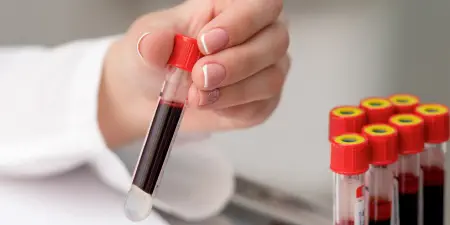Prostate Cancer

Trustworthy Expertise in Prostate Cancer Care
The prostate is a small yet vital gland crucial to male reproductive health. It sits just below the bladder and in front of the rectum and surrounds the top portion of the urethra, which drains urine from the bladder.
Prostate cancer, which occurs in the cells of the prostate gland, is common among men, particularly those above the age of 65. Although it can occur in younger men, the incidence of prostate cancer in men under 50 is quite rare.
When it comes to treatment for prostate cancer, Dr. Aarthy P, a skilled urology doctor, expertly navigates the complexities of the diagnosis, management, and treatment of the disease. She blends cutting-edge surgical techniques with a compassionate, patient-centric approach to ensure precision interventional care and desirable outcomes.
Dr. Aarthy crafts personalised care journeys from screening to surgical treatments and ongoing management plans to ensure a path of hopeful recovery from prostate cancer.
Prostate Cancer
The Risk Factors & Key Symptoms
- The Causes
- The Symptoms
- Age: The risk is higher for men over the age of fifty.
- Genetic Disposition: Mutation of BRCA1 and BRCA2 genes.
- Food & Lifestyle: High-fat diet and obesity in men.
- Family History: Incidence of family members being diagnosed with prostate cancer.
- Hormonal Factors: High testosterone levels may affect prostate cell growth.
- Nocturia or frequent urination, especially at night.
- Weak or interrupted urine flow.
- Presence of blood or semen in urine.
- Persistent pain in the hips, pelvis, and lower back.
- Difficulty in maintaining or achieving an erection.
Diagnostic Tests to Identify Prostate Cancer
Diagnostic tests are pertinent in helping identify prostate tumours and the stage and extent of their spread in the renal tissues. Dr. Aarthy leverages the diagnostic test results to customise her treatment for every patient. The tests include:
Prostate Cancer Treatment By Dr. Aarthy

Constant Surveillance
Consecutive monitoring with PSA tests, DRE, and biopsies to track prostate cancer in its early stages before commencing treatment.
Robotic Prostatectomy
Robotic procedure to remove the prostate gland to minimise the complications of cancer and enable a quicker recovery.
Radiation Therapy
High-energy radiation beams to destroy cancer cells, especially in localised prostate cancer. Radiation is also recommended as a follow-up treatment post-surgery.
Hormone Therapy
Reduces or inhibits testosterone production, effectively slowing the progression of cancer. It is commonly used when the cancer has spread beyond the prostate or as a component of a comprehensive treatment plan.
Chemotherapy
Administration of anti-cancer drugs to destroy cancer cells in patients with advanced stages of prostate cancer that has metastasised to other parts of the body.
Focal Therapy
Targeted treatment with cryotherapy and high-intensity-focused ultrasound (HIFU) to destroy cancer cells and preserve healthy tissue in certain parts of the body.
Brachytherapy
Internal radiation process to place radioactive seeds into the prostate to enable targeted treatment with minimum side effects.
Immunotherapy
A hopeful alternative that uses the body’s immune system to combat advanced stages of prostate cancer.
Experience Top-Tier Urological Care







